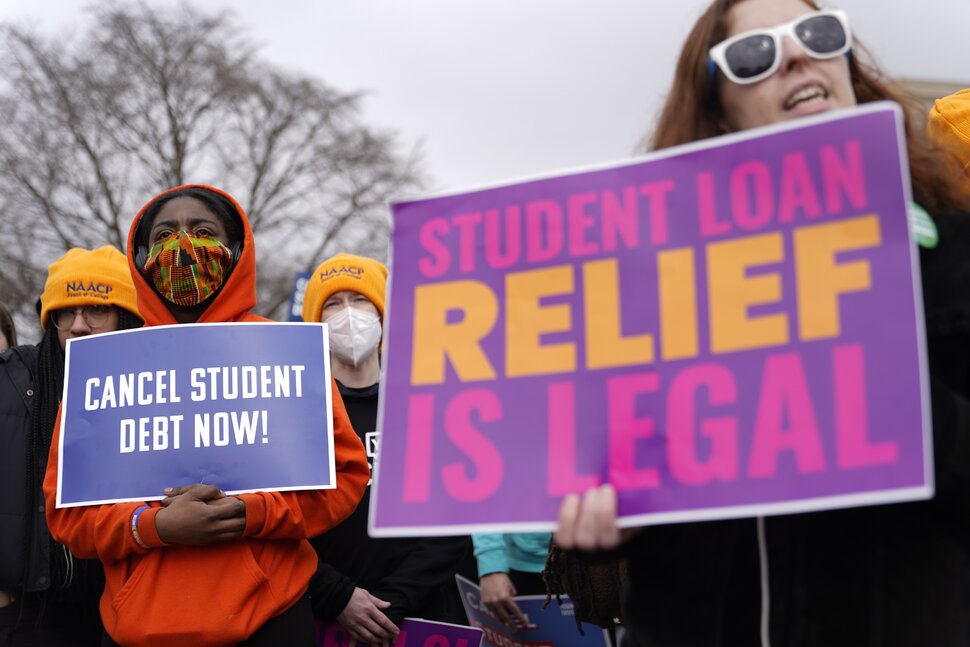Conservative justices raised questions about the president’s authority to waive hundreds of billions of dollars in student loan debt in order to check boxes on his education agenda.
Roughly 40 million federal student loan borrowers now hold their breath as Supreme Court justices deliberate over the fate of the Biden administration’s debt cancellation proposal in the wake of hearing oral arguments on Tuesday in two cases that challenge the executive authority used to establish the sweeping program.
Conservative justices, who constitute the majority of the court, raised major questions about President Joe Biden’s legal authority to waive hundreds of billions of dollars in student loan debt on the basis of the 9/11-era Heroes Act and skirt Congress in order to enact significant policy changes that check boxes on its agenda.
Meanwhile, the court’s three liberal judges refuted the narrative that the program was an overreach of executive authority and said that Congress created the Heroes Act explicitly to allow the education secretary to cancel debts in an national emergency such as the pandemic. They also voiced concerns over the number of borrowers who are projected to default or enter into forbearance if the loan cancellation plan is nixed.
Justice Sonia Sotomayor also voiced skepticism over giving judges – and not the education secretary, who as she said, “has the experience with these questions” – the authority to decide whether the program lives or dies. The comment, and others like it, underscored the inherent danger in the public increasingly viewing the country’s high court as an activist.
At issue is Biden’s plan to cancel $10,000 for borrowers making $125,000, or $250,000 for married couples, and $20,000 for those who also received federal Pell Grants. The proposal, announced in August, is estimated to cost up to $400 billion.
Solicitor General Elizabeth Prelogar, who argued on behalf of the Biden administration, said that Education Secretary Migeul Cardona “invoked the Heroes Act to provide a measure of loan forgiveness to ensure that this unprecedented pandemic does not leave borrowers worse off in relation to their student loans.”
“The secretary’s interpretation of this text is not just a plausible reading,” she said. “It’s the best reading. Congress expressly authorized the secretary to waive or modify any Title IV provision in emergencies to provide financial relief to borrowers. Loan forgiveness is a paradynamic form of debt relief. And the secretary acted within the heartland of his authority and in line with the central purpose of the Heroes Act in providing that relief here.”
Jim Campbell, the solicitor general of Nebraska who argued on behalf of the six states, countered that narrative, saying instead that the administration used “breathtaking power” when it established the student loan debt cancellation program – a new policy that stands to slash the major lending company’s revenue by as much as 40%.
“Never before has the Heroes Act been used to forgive a single loan,” said Campbell in his first appearance before the court. “He needs clear congressional authorization for such power. But he doesn’t have it here because the Heroes Act does not authorize this program.”
“The act permits the secretary to waive or modify existing provisions because of a national emergency,” he specified. “It does not permit him to rewrite existing provisions to create a new program that covers 95% of student loan borrowers and applies to them regardless of how the pandemic affected them.”
Notably, Justice Amy Coney Barrett, arguing alongside the court’s more liberal judges, pressed the issue of why Missouri and not the Higher Education Loan Authority of the State of Missouri, also known as MOHELA, brought the lawsuit, given that it’s MOHELA that stands to incur financial harm should the debt forgiveness plan proceed as proposed.
Prelogar had highlighted in her opening arguments how MOHELA “can sue in its own name but has chosen not to do so.” In fact, the state had to use what amounted to a Freedom of Information Act to procure documents from MOHELA that the lending company didn’t want to hand over.
Campbell said it was a matter of “state politics.”
At one point Justice Brett Kavanaugh also pressed Campbell, asking that if the Heroes Act gives the education secretary the power to “waive” any provision of the student loan program in a national emergency, then “why not just read that as written.” Campbell said that forgiving a loan is different from waiving a provision in the loan program.
Ahead of the marathon day of arguments, hundreds of supporters of the student loan debt cancellation plan – many young student loan borrowers of color – rallied outside the Supreme Court alongside progressive members of Congress who pushed Biden to use his executive authority and a broad coalition of advocacy organizations, teachers unions and civil rights groups.
“The Court knows President Biden has the legal authority to cancel student debt, and they have a clear and simple choice here,” said Rep. Ayanna Pressley, Massachusetts Democrat who spoke at the rally ahead of oral arguments on Tuesday. “Uphold the law and we can call it a day.”
“But this court has let us down before, overturning and obstructing the will of the people,” she continued. “This court has been weaponized before. This court has torn away our fundamental rights. But by hell or high water, we are going to get you the student debt cancellation that President Biden promised.”
A ruling could come at any time. The current pause on student loan payments ends on May 11, when the national pandemic emergency is officially set to expire, but many high court tea leaf readers anticipate the decision in June, when most major decisions are issued.

